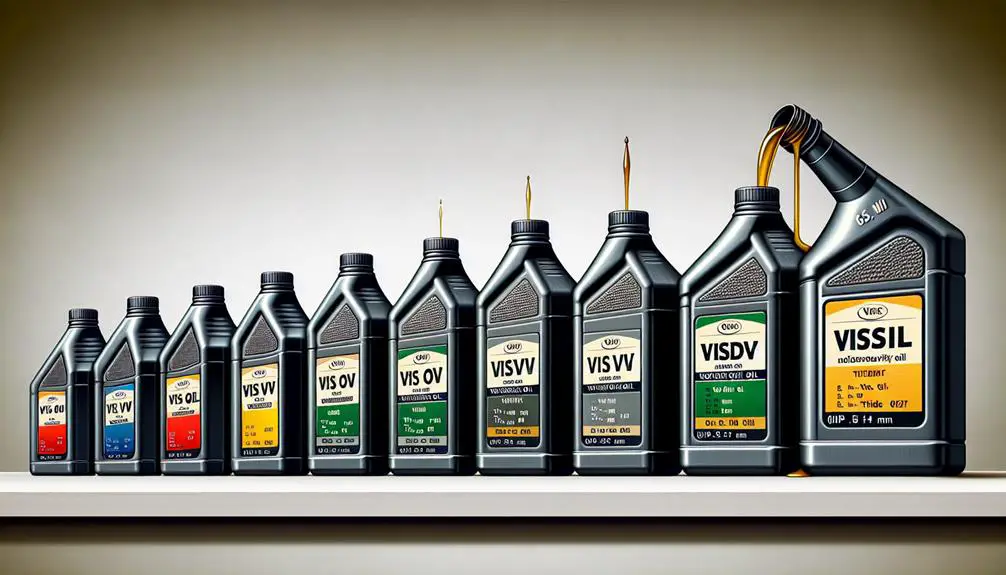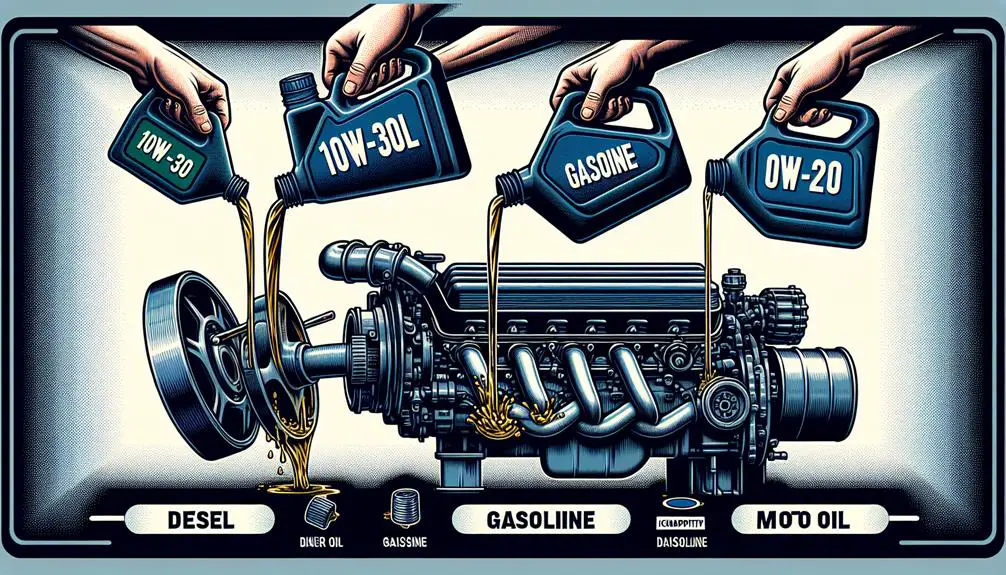When it comes to selecting the best viscosity grades for motor oils, you might stumble upon a maze of options and recommendations that can be overwhelming. However, understanding the nuances between different grades and their impact on your vehicle's performance is important for making an informed decision. By diving deeper into factors like engine type, driving habits, and environmental conditions, you can uncover the ideal viscosity grade that aligns perfectly with your car's needs. So, what exactly sets apart the ideal viscosity grades for motor oils? Let's explore the key aspects that play a pivotal role in this essential decision-making process.
Key Takeaways
- Lower viscosity grades like 0W-20 offer better fuel efficiency.
- Consider manufacturer recommendations for optimal engine performance.
- Choose viscosity grades based on driving conditions and temperature.
- High-quality oils with good heat resistance maintain stability.
- Proper viscosity selection reduces wear and promotes engine longevity.
Understanding Viscosity Grades

What exactly do viscosity grades indicate when it comes to motor oils?
Viscosity grades are basically a measure of how thick or thin the oil is and how it flows at different temperatures. The numbers associated with viscosity grades represent the oil's viscosity or resistance to flow; the lower the number, the thinner the oil, and the higher the number, the thicker the oil.
For example, a 5W-30 oil is thinner at low temperatures (the 'W' stands for winter) and maintains a stable viscosity at higher temperatures, making it versatile for year-round use.
Understanding viscosity grades empowers you to choose the right oil for your vehicle based on the operating conditions. By selecting the appropriate viscosity grade, you ensure proper lubrication for your engine components, leading to efficient performance and longevity.
This knowledge enables you to make informed decisions when selecting motor oils, taking control of your vehicle's maintenance and ensuring it runs smoothly and efficiently.
Impact on Engine Performance
Understanding how viscosity grades affect engine performance is essential for ensuring peak operation of your vehicle's engine. The viscosity of your motor oil can have a significant impact on how your engine performs under different conditions. Choosing the right viscosity grade can help optimize fuel efficiency, reduce wear and tear on engine components, and enhance overall engine performance.
When selecting a viscosity grade for your motor oil, consider factors such as temperature, driving conditions, and manufacturer recommendations. Using the wrong viscosity grade can lead to issues such as poor lubrication, increased friction, and decreased engine efficiency. Here is a simple guide to help you understand the impact of viscosity grades on engine performance:
| Viscosity Grade | Performance in Hot Conditions | Performance in Cold Conditions |
|---|---|---|
| Low | May thin out too much | May thicken and cause starting issues |
| Medium | Provides balanced performance | Offers decent performance but may not flow well |
| High | Maintains viscosity well | May be too thick for proper lubrication |
Cold Weather Suitability

When it comes to cold weather suitability, understanding winter viscosity ratings is essential for peak oil performance.
The ability of oil to flow smoothly in cold temperatures directly impacts your engine's startup and overall performance.
Cold start performance is greatly influenced by the viscosity grade you choose, affecting how well your engine functions in chilly conditions.
Winter Viscosity Ratings
Evaluating the cold weather suitability of motor oils involves considering their winter viscosity ratings. When choosing an oil, opt for a viscosity grade that guarantees proper lubrication during chilly temperatures.
Look for the 'W' on the label, which stands for winter, followed by a number. The lower this number, the better the oil performs in cold weather. For example, a 5W oil will flow more easily in low temperatures than a 10W oil.
This rating indicates the oil's ability to circulate quickly upon start-up, essential for protecting your engine in frosty conditions. Selecting the right winter viscosity rating promotes smoother engine operation and decreases wear during cold starts.
Don't let frigid weather hinder your vehicle's performance; liberate yourself from potential issues by picking a motor oil with a suitable winter viscosity rating. Your engine will thank you for the care it receives, ensuring dependable performance even in the coldest of days.
Oil Flow in Cold
For peak performance in cold weather conditions, ensuring smooth oil flow is essential for your engine's longevity and efficiency. When temperatures drop, the viscosity of your motor oil plays an important role in maintaining ideal lubrication.
In cold weather, oil tends to thicken, which can impede its flow and lead to difficulties in starting your engine. Choosing a motor oil with the right viscosity grade for cold weather conditions can help prevent these issues.
Low-viscosity oils, such as 0W-20 or 5W-30, are designed to flow more easily in cold temperatures, ensuring that essential engine components receive proper lubrication from the moment you start your vehicle. These oils provide quick circulation, reducing wear and tear on your engine during cold starts.
Cold Start Performance
Ensuring your motor oil's cold start performance is essential for top engine operation in chilly weather conditions. When temperatures drop, your engine oil thickens, making it harder for it to flow quickly to all parts of the engine.
To combat this, choosing the right viscosity grade is important. In cold weather, a lower viscosity oil, such as 0W or 5W, flows more easily at startup, providing essential lubrication to engine components faster. This quick flow reduces wear and tear on your engine during those critical initial moments.
Opting for a motor oil with good cold start performance also aids in protecting your engine from potential damage caused by inadequate lubrication. When your engine starts smoothly in cold weather, it's a sign that the oil is doing its job effectively.
Heat Resistance and Stability
When it comes to heat resistance and stability in motor oils, understanding how viscosity behaves under high temperatures is essential.
Factors affecting oil stability, such as oxidation and thermal breakdown, play a significant role in maintaining peak performance.
Knowing how heat can impact viscosity grades helps guarantee your engine runs smoothly and efficiently.
Viscosity Under Heat
Maintaining viscosity under heat is vital for motor oils to ensure peak performance and protection for your engine. When oil viscosity breaks down under high temperatures, it can lead to increased friction, reduced lubrication, and ultimately engine wear. Quality motor oils are designed to resist viscosity changes even in extreme heat conditions, ensuring your engine runs smoothly and stays protected.
To help you understand the importance of viscosity under heat, let's look at a comparison table:
| Viscosity Grade | Performance Under Heat | Engine Protection |
|---|---|---|
| 5W-30 | Excellent | High |
| 10W-40 | Good | Moderate |
| 20W-50 | Average | Basic |
Choosing the right viscosity grade that maintains its properties under heat is essential for your engine's longevity and performance. Remember, a well-protected engine is one that is free to deliver the power you desire.
Oil Stability Factors
To maximize the effectiveness of motor oils, understanding their heat resistance and stability is essential. Oil stability is vital for engine performance and longevity. When oils break down due to heat exposure, they can form harmful deposits that hinder engine function. High-quality motor oils are formulated to withstand extreme temperatures without losing their lubricating properties. Look for oils with additives that enhance stability, such as antioxidants and detergents.
Heat resistance is another key factor. As engines operate, temperatures soar, placing immense stress on oils. Opt for oils with a high viscosity index (VI) to make sure they maintain consistent performance across a wide temperature range. Oils with good heat resistance can protect your engine from wear and tear caused by friction and heat buildup.
Impact on Performance
Understanding the impact of heat resistance and stability on motor oil performance is essential for maintaining engine longevity and efficiency. When it comes to heat resistance, higher viscosity oils are better suited for withstanding elevated temperatures without thinning out excessively. This characteristic is vital, especially in high-performance engines or hot climates, where oil breakdown due to heat can lead to engine wear and reduced lubrication effectiveness.
Stability, on the other hand, guarantees that the oil maintains its viscosity grade over a wide range of operating conditions. Oils with good stability properties are less prone to viscosity changes, providing consistent lubrication and protection to engine components.
Fuel Economy Considerations

Consider how choosing the right viscosity grade for your motor oil can impact your vehicle's fuel efficiency. Opting for a lower viscosity grade, such as 0W-20, can enhance your fuel economy. Thinner oils reduce friction in the engine, allowing components to move more freely and requiring less energy to operate. This improved efficiency means your engine doesn't have to work as hard, translating into savings at the gas pump.
By selecting a motor oil with the recommended viscosity grade, you help your engine operate at its peak performance while maximizing fuel economy. A well-lubricated engine experiences less resistance, leading to smoother operation and better mileage. It's a simple yet effective way to cut down on your fuel expenses and reduce your environmental footprint.
When you prioritize fuel economy in your choice of motor oil viscosity grade, you're taking a proactive step towards a more efficient and cost-effective driving experience. Make the switch to a lower viscosity grade today, and feel the difference in your wallet and on the road.
Engine Wear and Tear
When it comes to engine wear and tear, the viscosity of motor oil plays an essential role in protecting your engine components.
Choosing the right viscosity grade can help reduce friction between moving parts, extending the life of your engine.
Additionally, the viscosity of the oil helps regulate temperatures within the engine, preventing overheating and potential damage.
Oil Viscosity Importance
Selecting the appropriate oil viscosity is essential in preventing engine wear and tear. When the oil viscosity is too low, it fails to provide sufficient lubrication, leading to increased friction between moving parts. This heightened friction can cause excessive wear on the engine components, reducing their lifespan and potentially resulting in costly repairs.
Conversely, if the oil viscosity is too high, it can struggle to flow properly throughout the engine, leaving certain areas inadequately lubricated. This insufficient lubrication can also contribute to accelerated wear and tear on critical engine parts, impacting performance and efficiency.
Friction Reduction Benefits
To minimize engine wear and tear, ensuring proper friction reduction through the use of suitable oil viscosity is paramount. When your engine components rub against each other, friction is generated, leading to wear and tear over time. By using motor oils with the right viscosity grades, you can greatly reduce this friction, promoting smoother operation and extending the lifespan of your engine.
Consider the table below to understand how different viscosity grades can impact friction reduction:
| Viscosity Grade | Friction Reduction Benefit |
|---|---|
| 0W-20 | Enhanced fuel efficiency and engine protection |
| 5W-30 | Balanced performance in various temperatures |
| 10W-40 | Improved high-temperature protection |
| 15W-50 | Enhanced protection for high-performance engines |
Temperature Regulation Significance
Proper temperature regulation plays a crucial role in minimizing engine wear and tear over time. When it comes to maintaining the ideal temperature in your engine, there are a few key points to take into account:
- Overheating: Excessive heat can lead to accelerated wear on engine components, causing them to break down prematurely.
- Undercooling: On the flip side, inadequate cooling can also be detrimental, as it may not effectively dissipate heat, leading to potential damage.
- Thermal Expansion: Fluctuations in temperature can cause materials to expand and contract, putting stress on engine parts.
- Oil Viscosity: The viscosity of your motor oil can impact how effectively it lubricates and dissipates heat, affecting overall engine performance and longevity.
Compatibility With Engine Types

Consider the engine type in your vehicle when evaluating the compatibility of viscosity grades for motor oils. Different engines have varying requirements when it comes to oil viscosity. High-performance engines, for example, may benefit from lower viscosity oils to guarantee proper lubrication under high speeds and temperatures.
On the other hand, older or more conventional engines might necessitate higher viscosity oils to maintain adequate lubrication and prevent excessive wear.
Understanding your engine's needs is vital in determining the right viscosity grade for your motor oil. Failure to use the correct viscosity may result in poor engine performance, increased wear and tear, and potential long-term damage.
It's important to consult your vehicle's manual or speak to a knowledgeable professional to determine the most suitable viscosity grade for your specific engine type.
Oil Change Frequency
When determining the appropriate viscosity grade for your motor oil, it's important to also consider the recommended oil change frequency for your vehicle. Regular oil changes aren't just a maintenance task; they're a way to keep your engine healthy and running smoothly.
Embrace the freedom that comes with knowing when and how to change your oil:
- Liberate Yourself: Break free from the old norms of changing oil every 3,000 miles; modern engines and oils can often go longer between changes.
- Empower Your Engine: Give your vehicle the care it deserves by changing the oil at the manufacturer's recommended intervals.
- Unshackle Your Wallet: Avoid unnecessary expenses by following a proper oil change schedule tailored to your driving habits.
- Revolutionize Your Maintenance Routine: Embrace a proactive approach to maintenance and enjoy a more efficient and reliable driving experience.
Manufacturer Recommendations

Following the manufacturer's recommendations for oil change intervals is crucial to maintaining your vehicle's peak performance and longevity. Your car's manufacturer knows your vehicle inside out, so trusting their guidelines guarantees you're giving your engine the care it deserves.
By adhering to these recommendations, you can avoid potential warranty issues and keep your engine running smoothly. Manufacturers often provide specific instructions tailored to your vehicle's make and model, taking into account factors like driving conditions and climate.
Don't let outdated myths or generic advice dictate your oil change schedule; stick to what your manufacturer suggests for the best results. Ignoring these recommendations could lead to premature engine wear, decreased efficiency, and costly repairs down the line.
Embrace the freedom of knowledge and empower yourself by following the expert guidance provided by the people who built your vehicle. Your car will thank you for it with reliable performance and a long, happy life.
Cost Vs. Performance Analysis
To determine the most cost-effective motor oil for your vehicle, compare the performance benefits of different viscosity grades available on the market.
When conducting a cost vs. performance analysis for motor oils, consider the following:
- High Performance Doesn't Always Mean High Cost: Don't assume that the most expensive motor oil is automatically the best for your vehicle. Some lower-priced oils can offer excellent performance.
- Consider Your Driving Habits: If you frequently drive in extreme temperatures or put a lot of strain on your engine, investing in a higher viscosity grade might be worth the extra cost.
- Long-Term Engine Health: Remember that using a high-quality motor oil can contribute to the longevity of your engine, potentially saving you money on costly repairs down the line.
- Environmental Impact: Some motor oils are more environmentally friendly than others. Consider the ecological cost when making your decision.
Frequently Asked Questions
Can Mixing Different Viscosity Grades Harm My Engine?
Mixing different viscosity grades could potentially harm your engine. It's essential to adhere to the manufacturer's recommendations for peak performance.
Inconsistencies in viscosity can lead to inadequate lubrication and increased wear and tear on engine components. To avoid potential damage, make sure you use the correct viscosity grade specified for your vehicle.
Always prioritize the health and longevity of your engine by following the recommended guidelines.
Are Higher Viscosity Grades Always Better for Engine Protection?
When it comes to engine protection, higher viscosity grades aren't always the superhero. They mightn't be the best fit for your engine.
It's important to match the viscosity grade to your engine's needs, considering factors like temperature and driving conditions. Opting for the right viscosity grade guarantees your engine runs smoothly and stays protected.
Don't just assume higher is better; choose wisely for peak performance and longevity.
Do Viscosity Grades Affect Turbocharged Engines Differently?
When it comes to turbocharged engines, viscosity grades can impact performance differently. The way oil flows through the engine plays a vital role in turbocharger lubrication and cooling.
Choosing the right viscosity grade is essential to maintain peak engine health. Be sure to consult your vehicle's manual or a trusted mechanic to determine the best viscosity grade for your turbocharged engine.
It's all about keeping your engine running smoothly and efficiently.
Can Using the Wrong Viscosity Grade Void My Warranty?
Using the wrong viscosity grade could indeed void your warranty. Imagine walking a tightrope without a safety net.
Manufacturers specify the correct viscosity to protect your engine. Ignoring this could lead to issues and give them a reason to deny warranty claims.
Stay informed and choose wisely to keep that safety net intact.
Is There a Difference Between Synthetic and Conventional Oil Viscosities?
Yes, there's a difference between synthetic and conventional oil viscosities. Synthetic oils typically maintain their viscosity better at extreme temperatures compared to conventional oils.
This can provide better protection for your engine, especially in harsh conditions. Make sure to check your vehicle's manual for the recommended oil viscosity grade to guarantee peak performance and longevity.
Using the right oil can make a significant difference in your engine's health.
Conclusion
So, when it comes to choosing the best viscosity grades for motor oils, keep in mind factors like engine type, driving conditions, and manufacturer recommendations.
The right oil can make your engine purr like a contented kitten and keep it running smoothly for miles and miles.
Don't skimp on quality – your vehicle deserves the best care possible for peak performance and longevity.
Choose wisely and watch your engine thrive!
